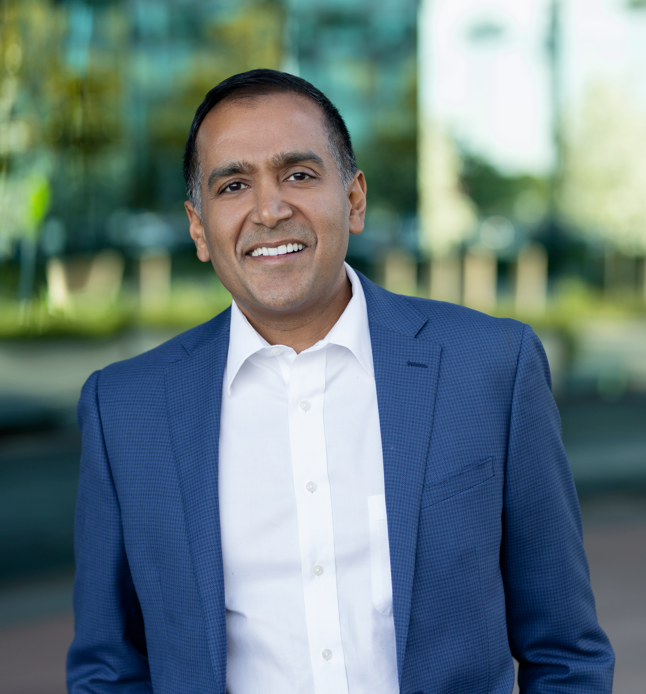The heath plan executive and Forbes contributor talks growing nonprofit scale, the industry's "toxic positivity," and why healthcare needs a new kind of leadership.
Dr. Sachin Jain is on the cusp of a new leadership role, something he's used to.
Jain—the current CEO of SCAN Health Plan and its parent company, The SCAN Group—will become the CEO of HealthRight Group. HealthRight is a new nonprofit healthcare organization that will combine the California-based SCAN Group and CareOregon to serve nearly 800,000 Medicare and Medicaid members in five states, provided regulators approve the merger.
In a press release on the merger, Jain noted: "For far too long, America's not-for-profit managed care organizations have operated at a scale disadvantage to their larger for-profit competitors."
In an exclusive interview with HealthLeaders, Jain had more to say—about the HealthRight merger, the unique role nonprofits play in the industry, and the state of the industry itself.
"Our distinctive approaches to duals will allow us to learn from each other, but our shared culture is service to the member," he says. "It was super obvious when we were meeting, like we were siblings separated at birth around mission, purpose and goals."

Sachin Jain, CEO SCAN Health Plan. Photo courtesy of SCAN Health Plan.
Jain on scale: Competing with the for-profits
Jain sees an important advantage in how HealthRight can care for vulnerable populations.
"These are two renowned not-for-profits coming together as a viable alternative to for-profit plans in the government space … We want to be able to scale to meet challenges at the level of for-profits and private equity organizations."
"Not-for-profits have the edge in making pro-patient decisions and can do more here on the margins. Before the current insulin pricing drama, for example, SCAN already covered insulin in the gap."
Jain adds that the way for-profits operate can generate self-limiting prophecies: "A world where the focus is quarterly targets leads to behaviors that are anti-patient and pro-profit."
But the CEO also cautions against a fixation on operational designations.
"We should be talking more about right and wrong."
Jain on healthcare: We are not Uber
Jain's belief extends to many aspects of healthcare, including how it stacks up against other industries.
"Healthcare has an extra set of obligations that are far greater. I think we sometimes rush to equate healthcare with other industries and forget that—when we're dealing with life and death, sickness and health—the rules are different than Amazon and Uber."
Jain adds: "We're all too quick to abstract obligations away. We need to be more thoughtful as a country, a society, and an industry."
.png)
Jain on providers: Leveraging the long term
With multiple organizations operating across multiple states, the potential for negative impact on providers is a factor, but not one Jain is concerned about.
"Provider-payer relationships are usually quite frayed. The stereotype is one of conflict and obfuscation," says Jain. Returning to HealthRight, the CEO adds: "We have stable management teams on all sides, people who have been with their organizations for a long time. Providers are engaging with leaders oriented to the long term."
Jain on the industry: No holds barred
If you've read Sachin Jain's Forbes articles, you know what he thinks about the industry's approach to things like high-profile mergers and value-based care (VBC). He added to those views for HealthLeaders.
For example, Jain expands the idea of "never events" beyond medical errors to healthcare's first harm: lack of access.
"In healthcare, we try to guide and manage as best we can, but some things should just never happen. Like cancer patients not having rapid access to expert medical opinions or stroke patients waiting in the ER. We've normalized waiting and suffering as an inconvenience. We have an obligation as industry to change this."
Another obligation is the industry's transformation from fee-for-service to VBC—one that cannot occur with the industry's current mindset.
"Toxic positivity or believing in a magic bullet occurs in healthcare because we're so desperate for solutions that we stop being critical. Being critical is not the same as not being optimistic. It's about applying a realistic lens."
Jain on leadership: Beyond CEO to MLK
HealthLeaders asked Jain how other industry leaders react to his unvarnished views—and how much that matters.
"I'm now 20 years into the work of making healthcare better. First, we thought the answer to healthcare reform was policy, then technology. The missing element is actually leadership. If I as a leader am not able to talk about uncomfortable truths, who is?"
Jain has been consistently recognized as a leading healthcare executive. In 2022, Modern Healthcare named Jain a Diversity Luminary as part of its Top Diversity Leaders in Healthcare awards. But his own model of leadership extends far beyond the industry.
"The kind of leadership I'm talking about is leadership with a capital L: people like MLK, Gandhi and Malcolm X, who really changed society. There's not enough iconoclastic energy in healthcare because most people aren't comfortable with it. In an industry as broken as ours, we have to ask ourselves hard questions about what leadership is and be willing to change our view of it."
“Toxic positivity or believing in a magic bullet occurs in healthcare because we're so desperate for solutions that we stop being critical. Being critical is not the same as not being optimistic. It's about applying a realistic lens.”
Sachin Jain, CEO of SCAN Health Plan.
Laura Beerman is a contributing writer for HealthLeaders.
KEY TAKEAWAYS
Dr. Sachin Jain, CEO of SCAN Health Plan and its parent company, The SCAN Group, is a unique voice among healthcare executives.
Jain's executive leadership is set to expand via SCAN's combination with CareOregon, called HealthRight.
In an exclusive interview with HealthLeaders, Jain spoke about the combination's implications for nonprofit scaling and what healthcare can gain by looking inside and out.
